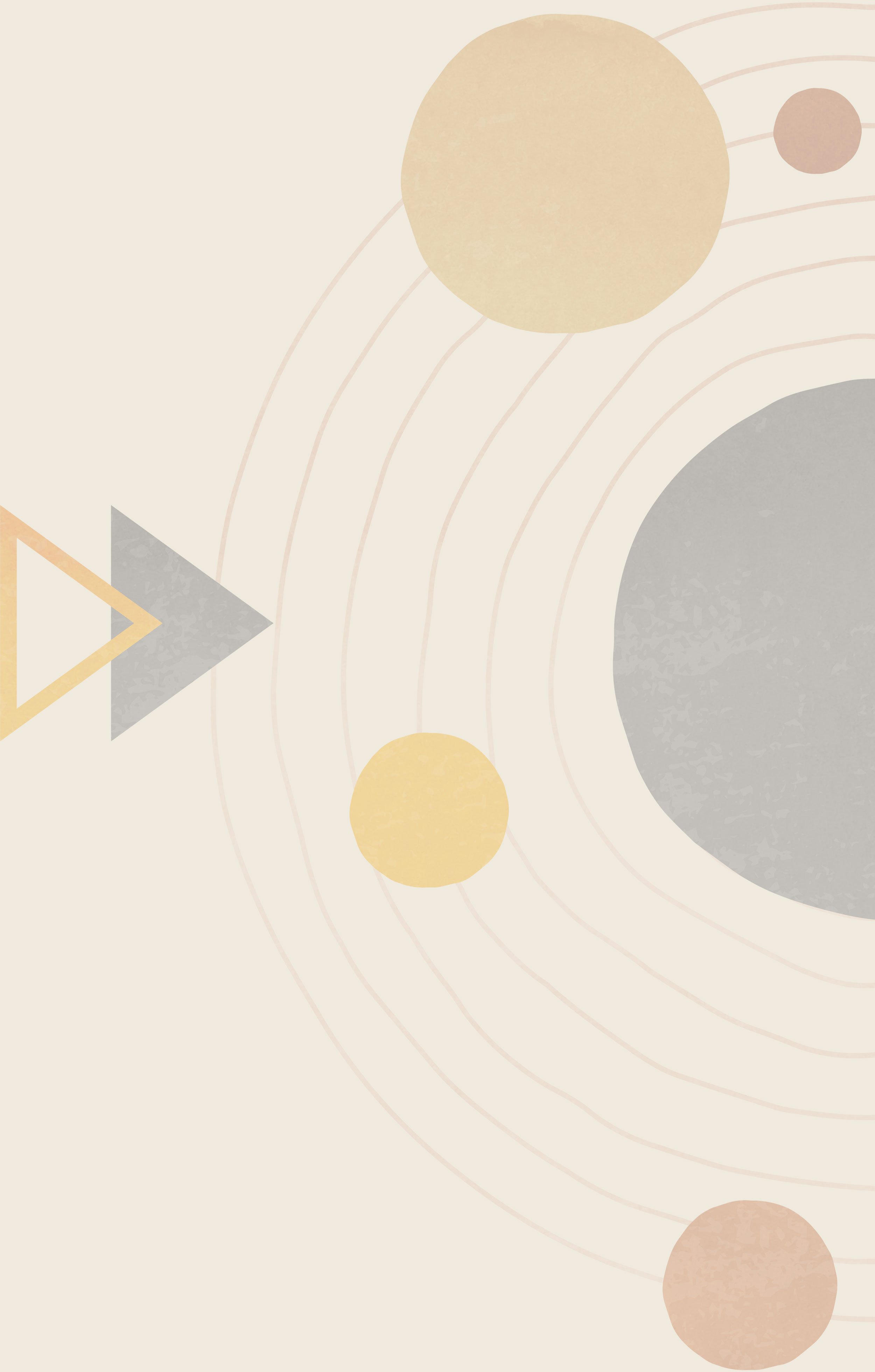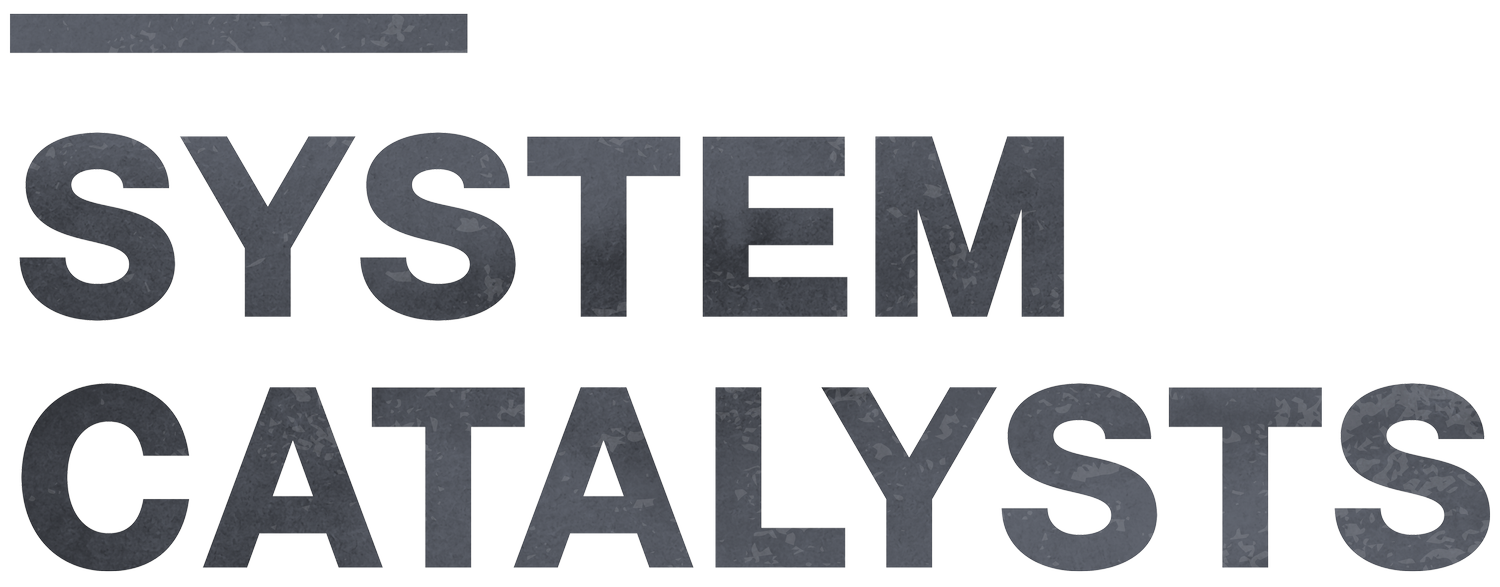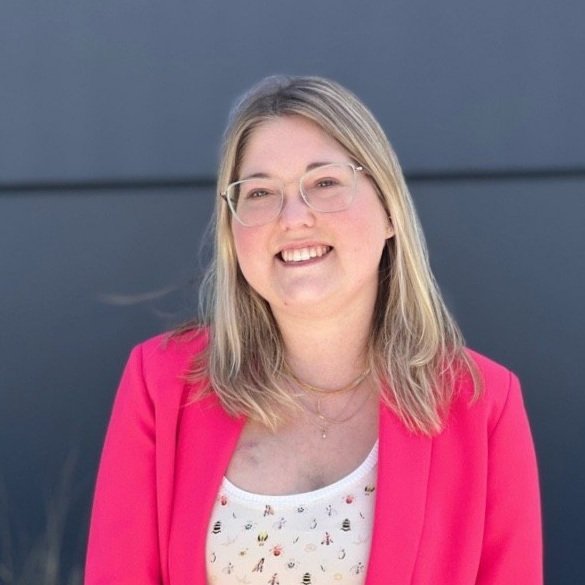
what in the world is a system catalyst? with english and jeff
bonus:
This podcast was created to tell the stories of people using a systems catalyst approach to solving the world’s biggest issues. But what does that actually mean? In today’s episode we take a step back to answer that question.
If you aspire to be a System Catalyst and need resources to help you on your journey, subscribe to our newsletter.
Learn more about our mission and our partners, visit systemcatalysts.com.
This podcast is produced by Hueman Group Media.
-
What in the World is a System Catalyst?
Featuring English Sall and Jeffrey Walker, Co-Hosts of System Catalysts
Jeff Walker: [00:00:02] I'm Jeff Walker. [00:00:02][0.5]
English Sall: [00:00:03] I'm English Sall. Welcome to System Catalyst, the podcast that cracks the code for making the world a better place. [00:00:10][7.0]
Jeff Walker: [00:00:19] This podcast was created to tell stories of people using a system catalyst approach to solving today's issues. So what does that mean? [00:00:27][7.5]
English Sall: [00:00:28] What we're talking about with a system catalyst approach is that this person can see the forest through the trees and they can say, oh, this person over here has a great idea, and so does that person over there. And then in order to scale those ideas and adapt those ideas, we need to bring in stakeholders. The government probably need to take this idea and adapt it. So how can I help facilitate that? And then also, by the way, the loose people over here with other resources that can really help kind of bridge the gap between some of these ideas and kind of the rising tide lifts all boats. So how did Jeff and I first get involved with System Catalysts? [00:01:13][44.8]
Jeff Walker: [00:01:15] You know, here I was doing a bunch of venture capital and private equity and and some philanthropy on the side. I got tired of doing deals and went up to Harvard and was a exec in residence at and Harvard Business School and Kennedy School, and started working on social change models because I liked that area. I thought it was really interesting and I've been enjoy doing that. Started bringing business practices together and said, these are useful but not complete. So how do we start listening to those that are really experienced in social change world and then start thinking about this larger system, rather than backing individuals who could change things that were specific, that they had seen. These entrepreneurs, like I had been involved in venture capital business, and then I get involved with a guy named Ray Chambers. And he was at the UN secretary general's envoy for, turns out, malaria and global health. And it worked with him as vice chair doing community health. It started saying, hey, he's doing some really interesting things with malaria and he's being catalytic. He's connecting lots of different stakeholders together to cause many, many more people to be saved from malaria than had been in the last 20 years. Why is that? Well, he's starting to bringing together people like the white House, people like ministries of health, people like the Global Fund, people like the Gates Foundation, and they're starting to work together, and they've never worked together before. And that work turns out, Ray, is this catalyst. So as you watch Ray and his team, you saw that it was completely different than what had been used to because of the way he operated. And so I started studying that, and I wrote cases about that and started thinking about how do we apply that kind of skill to other problems of the world. And that's where I met Austin Hurst, and he became partner in working in that community health. And then we hung out and met with Ingersoll, and that's how English got involved in what we were doing. And she got exposed to these system catalysts. And said maybe this is a good idea rather than just setting up other nonprofits. [00:03:28][133.4]
English Sall: [00:03:30] You know, for me, I came at this because I grew up never really even understanding kind of the impact or the complexity around global health, global development, or even philanthropy. And I spent a lot of my time just in the medical system in the United States. And I was born with a disease called cystic fibrosis. And at, just literally two weeks after my 19th birthday, I experienced to had a double lung transplant. And to me, access to health care, you know, that's the reason that I'm sitting here today. If I had been born in any other place, I probably wouldn't be alive. And as I got older and became more and more exposed to a lot of the complex issues that existed globally, especially in sort of the health and world of medicine and access to to health. I think I just got more and more fascinated with how to bring about more democratization to health and to access of health. And the Sall Family Foundation, which is my husband's family foundation, opened up this, this amazing opportunity for impact that I just felt so called to. And I was so excited to dip my toes in and figure out, hey, how do we make it? So that people all over the world are not worried about how they can get access to health? And I was lucky that initially when I was exposed to, you know, I had many conversations with a dear mutual friend of mine and Jeff's, doctor Raj Panjabi, who started Last Mile Health, which was really my kind of very first entry point into community health workers and, and the system of community health. I learned so much and wanted to better figure out how to steward resources in a way that really amplified the work that he was doing, and amplified the work that really existed and needed to be done in the community health space. And then, you know, later got introduced to Jeff and Austin and, what they were talking about in a way in which they wanted to steward resources, especially into the very complex system of community health and how they wanted to change that system in order to make sure that everyone had access to the health care that they needed. That just really spoke to me. And that's really how I sort of became part of this team. What Jeff and Austin were trying to do, of trying to steward catalytic dollars, building an ecosystem or trying to identify the gaps. You know, there was just so much data. There was just so much to back it up. Community health workers are the backbone of health care globally. And how do we enable them to just do what is needed to be done and provide health care, and especially in remote places, especially where access to health care is not, is not a given. [00:06:35][185.1]
Jeff Walker: [00:06:36] You know, Ray Chambers, the ultimate system catalyst, who was our friend, stepped back and started to look at that larger system. You know, he brought in people to start talking to people and start talking to ministries of health and start talking to the global find and start talking to those on the ground who were manufacturing bed nets, which were used to stop malaria mosquitoes from biting people during the night. So before he figured out what exactly to do, he went out and found other people who cared about the same problem. And let's work on the problem together. So problem first. [00:07:12][36.4]
English Sall: [00:07:13] It takes both, right? It takes the locally driven as far as who is on the ground, what are the ideas? What is the true system. And then it also takes that network support right to scale, to attract the funding, to get the resources into the work that needs to be done, and then also expand and adapt and spread the idea. And so, Jeff, what in your mind, what what does it mean to actually be network supported? [00:07:41][27.3]
Jeff Walker: [00:07:42] Well, I think that skill to be a network support individual is so different than someone who is a classic social entrepreneur. You know, the classic, I'm going to go into Liberia and create community health workers that will be employed by my organization, who go in and do the work. That's one strategy. But to step back and look at the system, saying, I want to be higher leverage than that. I want to look at the problem. It takes a managed ego. Take someone who says, I don't know the answers. I'm going to try to go out and find people to work with, to come up with the different tools that make sense in Liberia. That might not make sense in Nigeria. To find those things that might work locally and then help them. And that's a network support individual who can help best practices be shared, data be measured. Figure out resources that are needed by the system overall. Help start up the little organizations that might be able to educate ministries of health professionals like we did, and the community health experience. So it's a quite a different role. And we're starting to find those. [00:08:53][70.8]
English Sall: [00:08:53] Yeah, I think about those in social enterprise. There are the idea people, and I think that that's absolutely necessary. I think that we need those people. I would even sort of make the comparison of the social enterprise the same as the the tech entrepreneur or the person who is saying, I've got this nugget of an idea and I want to bring it to bear. And that's where, you know, someone kind of needs to either create an organization or get funding around kind of that, that idea. I think that what we're talking about is the person or the entity or the team that comes in and can look at the whole system and say, how do I help orchestrate this to all move in the same direction in a way that is not competitive, in a way that is egoless, and in a way that really manages the change of an entire system versus the scaling of one solution. [00:09:47][53.3]
Jeff Walker: [00:09:48] Once you find these partnerships and once you have these catalytic experiences, you stay together. It's more fun. There was a joy to being on, you know, this path with others and lowering your walls and being collaborative and sharing. And it was much more effective because all of a sudden their network started coming together. We didn't invent system change, but we certainly helped support it and bring it about, particularly as it related to donors and donor networks. And it's not just collaboration with donors. It's really lowering that wall and saying donors don't know everything. Donors can come together and work as partners with those that know a lot about the system who are proximate to the system. [00:10:33][45.1]
English Sall: [00:10:34] We see a lot of these systems change. Efforts work because people spend so much time intentionally listening to the people that are up front and up close to the actual problem. It's not enough to just have a great idea that comes out of an office. It is so important to be such an active listener when it comes to how to steward resources in a way that really meets the community where they are. And I think that what we're trying to highlight with respect to our systems change stories, and these catalysts that we're bringing on this show is to say, hey, there's actually such a better way to do it, and there's such a better way that involves not only the joy of pure collaboration between stewards of resources and people on the ground making the impact. But it's also the ideas that sort of come out of these with just the donors or just the organizations or just the stewards of resources. It has to come from all parts. It has to really come from a community driven approach to say, this is what's going to work for us, and this is what is not going to work for us and our job as donors and stewards of resources to listen. [00:11:50][75.6]
Jeff Walker: [00:11:51] Once you start linking, it continues to expand. I think that's the beauty of this. And we used to call them system orchestrators. We said it doesn't really just feel right because an orchestrator, typically I'm a music freak. I love music and playing together. And so it's not just the conductor up there telling people what to do. In a classical sense, it's more jazz. It's more somebody there who can be catalytic, helping people rise up and perform better than they performed before and share their knowledge and work together, and then have an impact in the audience to have an impact with. Or there's a purpose and a cause. And when that happens, the flow happens and it all comes together. And that's what we sit in going, guys, there's really great opportunities to do this, and there's people that are doing it time and time again around the world. Let's find them. Let's tell their stories so other people can do this as well. And to me, it's these stories that we find people listening to saying, oh, I can do that. It's not just one person, you know, Ray chambers, who has so many contacts who can do this. I can't do this. But we find that Phyllis and Clare, who came into this with not very many contacts and network, but they had the understanding of how to do this can affect the entire system. And some people feel like that. That's impossible. I can't go after homelessness. Well, we showed you Community Solutions and that they are having a major impact on homelessness because they're bringing these tools of system change together with local change agents. And we found that there is a way to actually create changes in the way people give. So you have 100 countries working together with Giving Tuesday. And it raised this year $3.4 billion on just Giving Tuesday. How did that happen? [00:13:43][112.2]
English Sall: [00:13:45] In case you missed the stories Jeff mentioned, you can catch up by exploring our previous episodes. [00:13:51][5.6]
Jeff Walker: [00:13:53] So we're sort of finding these tools and these skills that are put together by these system catalysts. And the more we find, I think the more can connect individuals who want to be, you know, catalytic and also donors who want to fund individuals who are these catalysts. And we're finding more and more of them with our partners, the Skoll Foundation, you know, with our partners at New Profit and Aspen Institute, and Boldly Go in a variety of others saying, hey, we want to focus on supporting those because they have more leverage. There's more leverage for our donors dollars and the donors have more fun. They have joy doing this with others. So to me, that's the podcasts is bringing these stories out. I learned a lot, and I learned, you know, how to do this better because we're always evolving. We're always trying to figure this out in fighting to figure out how to apply it to others and showing that the impossible collaborations are possible between government and non-profits and for profits and foundations in a variety of others. [00:14:58][64.6]
English Sall: [00:14:59] You know, I think the hope also is that maybe there's a few of those people that want to be a system catalysts and don't really know where to start. So I'm also really hoping that these stories can can give someone else kind of the the fire that they need to jump into that role. [00:15:13][13.9]
Jeff Walker: [00:15:14] This locally driven, network supported model. It's tough. That's why, you know, System Catalyst, we interview a ton of different people who were doing it. So the role models how to bring together people like activists and philanthropists and change makers. To find those weak links in the system and repair them, or leverage them to make them better. [00:15:33][19.6]
English Sall: [00:15:34] Yeah, exactly. Jeff. Some of the questions that I keep thinking about, too are like, how do you bring opposed parties to a mutual understanding? How do you cultivate and sustain a movement? [00:15:45][11.5]
Jeff Walker: [00:15:47] How do you bring local and national governance together? How do you measure performance along the way, and how do you rally resources and make this all work? [00:15:55][8.1]
English Sall: [00:15:56] If you want answers, please subscribe and we're excited to have you join us on this journey. That's it for today's show. Please don't forget to subscribe to System Catalysts so you don't miss out on a new episode. Also, do us a huge favor by rating our podcast and leaving us a review. Thank you all so much for joining us, and we'll catch you all in the next episode. [00:16:26][30.5]
Jeff Walker: [00:16:28] Before we go, I'd like to thank our producers at Hueman Group Media. We'd also like to thank our incredible network of partners who are supporting our mission the Skoll Foundation, the Aspen Institute's Aspen Global Leadership Network, Echoing Green, DRK Foundation, Maverick Collective, Virgin Unite, Charlize Theron Africa Outreach Project, Boldly Go Philanthropy, Synergos, Forward Global, Nexus, and New Profit. If you're interested in becoming a system catalyst, you'd like to learn more about our partners, please visit System catalyst.com. [00:16:28][0.0]
[952.6]
Jeff Walker
Co-host, System Catalysts
Episode Guest:
English Sall
Co-host, System Catalysts







